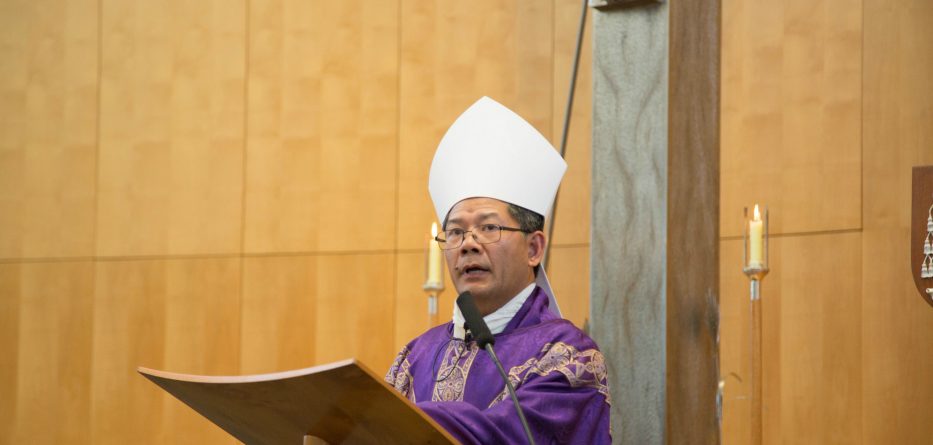Most Reverend Vincent Long Van Nguyen OFM Conv DD STL, Bishop of Parramatta
Homily for the Fourth Sunday of Easter in Year B 2018 at St Patrick’s Cathedral, Parramatta
22 April 2018
Brothers and Sisters,
The image of Jesus as the Good Shepherd is one of the most endearing and familiar images in popular piety and devotion. Yet it is perhaps also the most sentimentalised and domesticated to the extent that we are not sufficiently challenged by the message it is meant to convey. For when Jesus identified himself as a shepherd, he in fact made himself an outcast. Shepherds were not only of lower class but also of a different race to the Jews. Even to this day, shepherds in Palestine are generally descendants of the nomadic Arabs, known as the Bedouins. In calling himself a shepherd, Jesus became a boundary breaker. He went beyond the boundary of his social status, race and culture in order to embrace others who were considered outsiders. By doing so, he demonstrated to us the very nature of God which is inherently life generating and affirming.
Scriptures for this Fourth Sunday of Easter are at pains reinforce this truth. God in Christ identifies himself with the powerless and vulnerable. Hence, to be his follower, is to make the care for the vulnerable and the discipleship of vulnerability the bedrock of our lives.
In the first reading, Peter – filled with the Holy Spirit – is able to articulate the core message of the Good News. Instead of relishing the public admiration after he had healed the cripple, Peter tells the people that it is the power of the Suffering Servant Jesus that makes all things possible. It is he, Peter continues, the stone rejected, who became the corner stone and living power of the believers. In Jesus, we meet a God who saves not by a show of force. Instead, our God who saves is one who suffers with humanity. In this consists the paradox of the Christian faith, that God of power chose the path of weakness, vulnerability, suffering and death.
In the Gospel, Jesus uses the Parable of the Good Shepherd to show how much he cares for all, but especially the weak and vulnerable. He is the ultimate expression of the divine pathos towards humanity. “I am the Good Shepherd who lays down his life for his sheep.” In Jesus who surrounds himself with the outcast, we see a God of solidarity and vulnerability. In Jesus, we meet a God who disturbs our comfort and pushes us out to the periphery to be with the least of his brothers and sisters.
Dear friends,
The Church today also needs true shepherds who care for God’s flock scattered, wounded and hurt. The Church like Israel of old will have a new future only if its leaders act not with self-interest or even the interest of the institution, but with integrity, justice and compassion. The Royal Commission has highlighted the need for the leaders of the Church to embrace a more Christ-like way of shepherding. God’s unconditional love and preferential option for the marginalised must be acted out by our solidarity, servant-leadership at the edges of society. We must have the smell of the sheep, walking with people, identifying with them in their struggles, their questions and their uncertainties.
For many, the Church today is like a flock of sheep scattered, disoriented, wounded and hurt. There is also a sense of diminishment in terms of the Church’s moral stature in society. There is precious little ‘trust capital’ left in the Church leaders. Yet, it is not time for defensiveness or despair.
Rather, it is precisely in this time of humility that we must seek to rebuild, renew and reimagine. We do so by reclaiming not the former prestige and affluence, but the essential quality for Christian living and witness. We simply must make the discipleship of powerlessness and vulnerable trust the cornerstone of the Church again. Only by standing on the side of the powerless and the vulnerable, only by living authentically the call to poverty, simplicity and humility can our voice be credible and our trust regained.
This Sunday is also designated as Vocations Sunday. We reflect on our Christian vocation to holiness. Pope Francis reminds us in his new exhortation that each of us is called into existence and each of us is chosen for a purpose in this world. None of us is excluded from the love of God and none of us is outside God’s plan, no matter who we are and what circumstances we find ourselves.
God’s plan for us is to live fully our human life. This is why Jesus said, “I have come that you may have life and have it abundantly”. To live fully is to be all that we can be and to love unsparingly. The prophet Micah reminds us that the Lord requires us to act justly, to love tenderly and to walk humbly with God. The Church is by her very nature missionary, the Christian vocation is necessarily born of the experience of mission. Hearing and following the voice of Christ the Good Shepherd, means letting ourselves be attracted and guided by Him, in consecration to Him; it means allowing the Holy Spirit to draw us into this missionary dynamism, awakening within us the desire, the joy and the courage to offer our own lives in the service of the Kingdom of God.
May we be strengthened to walk the journey of faith and we may be leaven to the Kingdom through our active discipleship, witness and engagement in the world.








